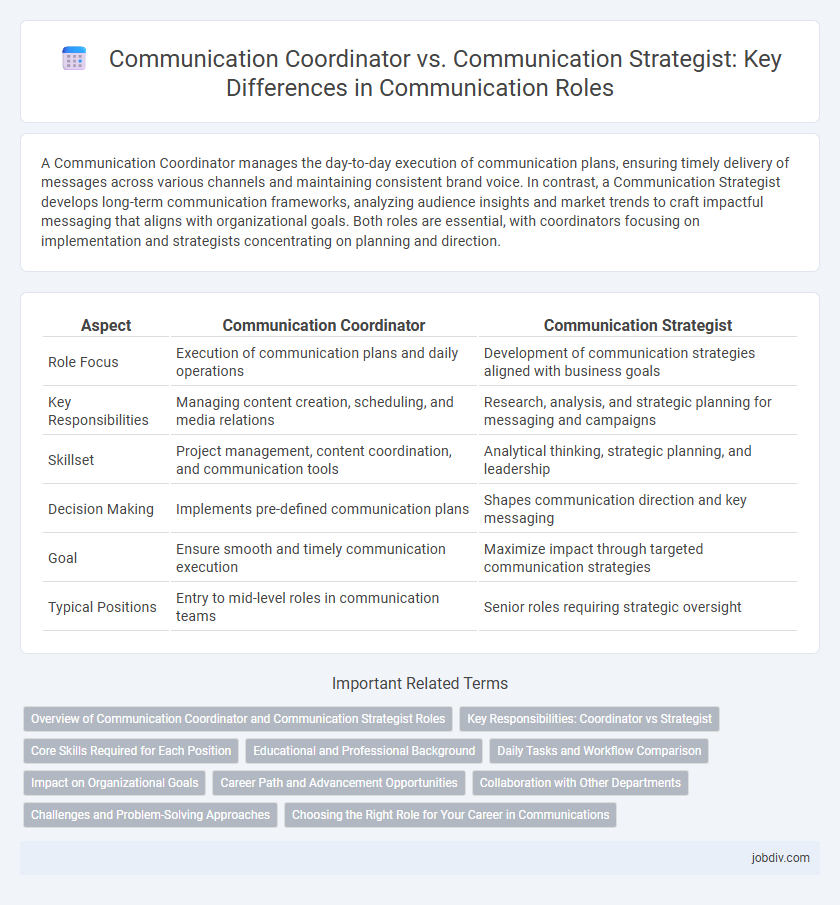A Communication Coordinator manages the day-to-day execution of communication plans, ensuring timely delivery of messages across various channels and maintaining consistent brand voice. In contrast, a Communication Strategist develops long-term communication frameworks, analyzing audience insights and market trends to craft impactful messaging that aligns with organizational goals. Both roles are essential, with coordinators focusing on implementation and strategists concentrating on planning and direction.
Table of Comparison
| Aspect | Communication Coordinator | Communication Strategist |
|---|---|---|
| Role Focus | Execution of communication plans and daily operations | Development of communication strategies aligned with business goals |
| Key Responsibilities | Managing content creation, scheduling, and media relations | Research, analysis, and strategic planning for messaging and campaigns |
| Skillset | Project management, content coordination, and communication tools | Analytical thinking, strategic planning, and leadership |
| Decision Making | Implements pre-defined communication plans | Shapes communication direction and key messaging |
| Goal | Ensure smooth and timely communication execution | Maximize impact through targeted communication strategies |
| Typical Positions | Entry to mid-level roles in communication teams | Senior roles requiring strategic oversight |
Overview of Communication Coordinator and Communication Strategist Roles
A Communication Coordinator manages daily communication activities, including content creation, media scheduling, and stakeholder engagement to ensure consistent messaging across platforms. A Communication Strategist focuses on developing long-term communication plans, analyzing audience insights, and aligning messaging with organizational goals to drive effective brand positioning. Both roles require strong interpersonal skills, but the coordinator emphasizes execution while the strategist prioritizes planning and evaluation.
Key Responsibilities: Coordinator vs Strategist
Communication Coordinators manage daily communication tasks such as content creation, scheduling, and stakeholder engagement to ensure consistent messaging across platforms. Communication Strategists develop comprehensive communication plans, conduct audience analysis, and align messaging with organizational goals to drive long-term brand positioning and impact. Coordinators focus on execution and operational management, while strategists emphasize planning, strategic alignment, and measurement of communication effectiveness.
Core Skills Required for Each Position
A Communication Coordinator requires strong organizational skills, proficiency in content creation, and expertise in managing communication channels and events to ensure consistent messaging. In contrast, a Communication Strategist needs advanced analytical abilities, strategic thinking, and a deep understanding of audience behavior to develop comprehensive communication plans that align with business goals. Both roles emphasize excellent written and verbal communication skills but differ in focus, with coordinators managing execution and strategists driving overall strategy.
Educational and Professional Background
A Communication Coordinator typically holds a bachelor's degree in communications, marketing, or public relations, with experience in project management and content creation within diverse organizational settings. A Communication Strategist often possesses advanced qualifications such as a master's degree in strategic communication or business administration, combined with expertise in market analysis, brand development, and long-term campaign planning. Both roles benefit from strong interpersonal skills, but strategists require a deeper understanding of audience segmentation and communication frameworks.
Daily Tasks and Workflow Comparison
Communication Coordinators manage daily communication tasks such as content creation, scheduling social media posts, drafting press releases, and coordinating internal communications to ensure consistent messaging. Communication Strategists focus on developing long-term communication plans, analyzing audience data, setting campaign goals, and aligning messaging with organizational objectives. While Coordinators handle execution and immediate responses, Strategists prioritize research, strategy formulation, and performance assessment to guide effective communication efforts.
Impact on Organizational Goals
A Communication Coordinator ensures consistent messaging and facilitates smooth information flow, directly supporting operational efficiency and brand alignment within the organization. A Communication Strategist develops long-term communication plans that align with organizational goals, driving stakeholder engagement and enhancing market positioning. Both roles impact organizational success, with coordinators focusing on execution and strategists concentrating on strategic direction.
Career Path and Advancement Opportunities
Communication Coordinators typically manage day-to-day communication tasks and support campaign execution, serving as entry-level roles that build foundational skills in content creation and stakeholder engagement. Communication Strategists focus on high-level planning, crafting integrated communication plans aligned with organizational goals, which positions them for leadership roles such as Communication Director or Chief Communications Officer. Career advancement from Coordinator to Strategist requires developing strategic thinking, data analysis capabilities, and expertise in brand management to influence decision-making and drive organizational communication success.
Collaboration with Other Departments
A Communication Coordinator facilitates seamless collaboration by managing day-to-day communication tasks and ensuring consistent messaging across departments. A Communication Strategist develops comprehensive communication plans that align with organizational goals and foster interdepartmental cooperation for long-term success. Both roles require strong interpersonal skills to coordinate efforts and drive unified communication strategies within the company.
Challenges and Problem-Solving Approaches
Communication Coordinators face challenges such as managing day-to-day message consistency and coordinating multiple channels, requiring strong organizational skills and rapid response tactics to solve issues. Communication Strategists encounter complex challenges related to long-term brand positioning and stakeholder engagement, employing data-driven analysis and adaptive planning to create effective communication frameworks. Both roles demand problem-solving approaches that balance immediate operational needs with strategic communication goals to ensure cohesive messaging.
Choosing the Right Role for Your Career in Communications
A Communication Coordinator manages day-to-day communications tasks, including content creation, event coordination, and maintaining communication channels to ensure consistent messaging. In contrast, a Communication Strategist develops long-term communication plans, analyzes audience insights, and aligns messaging with organizational goals to drive brand growth. Choosing the right role depends on whether you prefer hands-on execution and operational support or strategic planning and high-level decision-making in your communications career.
Communication Coordinator vs Communication Strategist Infographic

 jobdiv.com
jobdiv.com